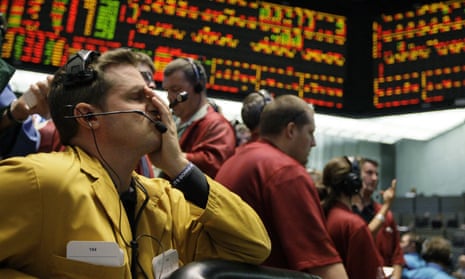Ten years ago tomorrow, the US government allowed the Wall Street bank Lehman Brothers to go bust, an event that seemed to mark a historical denouement: the end of an American century culminating in humiliating failure of its economic policy. In the days that followed, the shock waves crippled other major institutions, petrified money markets and ultimately destroyed millions of jobs. The banking crisis was transatlantic: German lenders were bailed out, in Ireland the state stood behind bank liabilities three times the size of the nation’s GDP, and in Britain one of the biggest banks in the world, RBS, was nationalised. The only comparable event was the great depression of the 1930s. As the historian Adam Tooze, in his magisterial work Crashed: How a Decade of Financial Crises Changed the World, points out, “global industrial output, stock markets and trade were all falling at least as fast in 2008-2009 as they had in 1929”.
The economic consequences of events a decade ago are still reverberating through politics. While ordinary workers in advanced economies saw public services cut, wages stagnate and living standards fall, the state saved the collapsing financial system by creating money and cutting interest rates. In the US, while the banks and lenders were bailed out, more than 9 million American families lost their homes to banks or were forced to sell up. In Britain, bankers’ bonuses are almost back to pre-crisis levels, while the nation endures the longest period of wage stagnation since the 1860s. The 2008 financial crash exposed the US Federal Reserve as the vital link in a global chain of a few dozen banks. According to Mr Tooze, the Fed’s unpublicised role was to bail out the world. It provided about $5tn in liquidity and loan guarantees to large non-American banks. It also sent $10tn to foreign central banks through currency swaps. All this money was eventually repaid, with interest, but it was nevertheless made available to the banks, their shareholders and their outrageously remunerated staff who had, through acts of commission or acts of omission, brought the world to its knees.
Globalisation has been marked by the emergence of a world system created to protect the interests of capital, but it was still shocking to understand that the most important consideration for politicians was to prop up the financial system. Their defence is that, without doing so, the worst economic disaster since the 1930s would have become the worst ever. Since then there has been no rethink of the established tenets of the pre-crisis free-market consensus. This is the opposite of what happened after the fall of Keynesian thinking in the 1970s. It was replaced by deregulation, privatisation, fiscal austerity and the rule of the market, marked by rising inequality. The consensus was that politics was no longer a partisan confrontation but could be reduced to the neutral management of public affairs. The free market’s failures in 2008 exposed this as hollow.
What is required now is a much more fundamental review of the role of government, to examine other ways of providing a good economic life for voters rather than just relying on markets. There must be more than just concern over rising inequality and poverty levels. Why should lower taxes and removal of worker safeguards be the only economic prescription for recovery? Finance needs a challenging regulatory environment but also a reckoning over how effective it is at motivating growth in the real economy. In Britain, Jeremy Corbyn has at least some answers to these questions. Politicians must come up with ways of rejecting the current system without falling into a brand of populism rooted in ignorance, prejudice, fear and isolationism. That is where the US finds itself today.
In 2018 the climate is potentially much more dangerous than 2008: British households are highly indebted. The lack of international cooperation makes a coordinated response to a major financial crisis harder. A more balanced multilateral monetary system, less reliant on the dollar, is needed to restore a degree of sovereignty. The modern economy is increasingly being dominated by a monopolistic tendency supported by political insiders who benefit from rent-extracting firms. What is required is a counter-revolution in ideas, to reset the boundaries between the state and market and reinsert ideas of how a civilised society should treat its people. In the weeks after the Lehman Brothers bankruptcy, free-marketeers admitted their “whole intellectual edifice collapsed”. It is time for their opponents to fill that vacuum.
